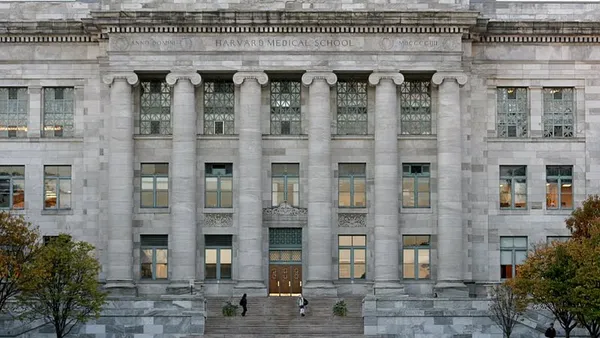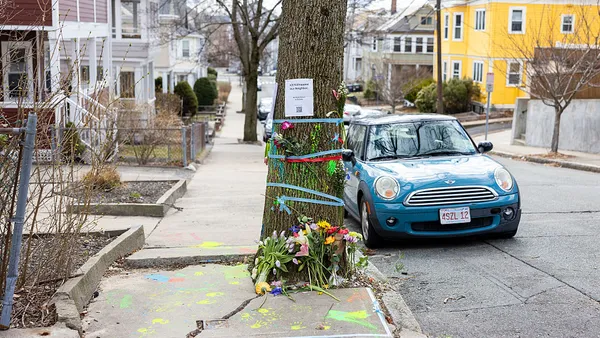Dive Brief:
- The University of Michigan has scrapped its multimillion dollar university-wide strategic plan to promote diversity, equity and inclusion amid increasing pressure from the Trump administration on the sector.
- With the move, the public flagship shuttered two equity-focused offices — its Office of Diversity, Equity and Inclusion and Office for Health Equity and Inclusion — and ended all DEI programming and spending, according to the Thursday announcement.
- The student services provided by the DEI office will be housed under different unnamed departments. And employees who led DEI efforts will "refocus their full effort on their core responsibilities," university leadership said. They did not say if the restructuring would result in layoffs.
Dive Insight:
In Thursday’s announcement, President Santa Ono and other university leaders cited President Donald Trump's flurry of executive orders attacking DEI efforts and the U.S. Department of Education's resulting Dear Colleague letter.
Many universities across the country have already caved under the Trump administration's pressure. But the University of Michigan's compliance represents a significant victory for the White House.
In fall 2023, the public flagship launched its DEI 2.0 Strategic Plan, a five-year blueprint even longer in the making.
"The university’s DEI efforts are a perpetual work in progress, and we are committed to this ongoing journey and one where we never reach our destination," the plan's webpage said. It describes the plan as a "campuswide effort engaging all levels of the university"
In total, the university spent some $250 million dollars on diversity efforts, according to Regent Jordan Acker.
But Acker and other critics have argued that the investment did not result in the desired outcome.
"The population of minority students at UM has grown little — and much of the resources we've devoted to these efforts has gone into administrative overhead, not outreach to students," he said in a Thursday statement on social media.
Before the launch of the university's first DEI strategic plan, it faced a years-long struggle boosting Black enrollment, to the dissatisfaction of students and administration alike.
In 2023, 14.1% of Michigan residents were Black, according to federal data. That fall, just 4.6% of the university's students were Black.
Acker described the elimination of the university's DEI efforts as a means of focusing resources on programs of "real impact," such as the university's Go Blue Guarantee, which offers free and reduced tuition to qualifying Michigan residents.
In its announcement this week, the university spotlighted Go Blue and its Wolverine Pathways program — which works with K-12 students in under-resourced communities — when touting its student successes.
Among undergraduates, first-generation students have increased 46% and Pell Grant recipients by about 32% since 2016, university leaders said Thursday, attributing the growth to those two programs.
The University of Michigan also said Thursday it will expand another student success program designed for undergraduates who are former foster care youths or are "navigating their educational journey without the support of their parents or guardians."
Because those initiatives do not explicitly mention diversity or race, they are set to survive the university's purge of programs.
Not all will be so lucky.
Among its many DEI programs, the University of Michigan oversees the National Center for Institutional Diversity, the Diversity Scholars Network, and a public safety task force dedicated to addressing structural racism in policing.
The university's general counsel will be conducting an "expedited review" of all institutional policies, programs and practices to ensure compliance with the Trump administrations' orders, according to Thursday's announcement.
Additionally, all departments are expected to ensure their webpages are in compliance and "reflect the status of current programmatic directions" at the university.
"These decisions have not been made lightly," Ono said Thursday. "We recognize the changes are significant and will be challenging for many of us, especially those whose lives and careers have been enriched by and dedicated to programs that are now pivoting."
Additionally, the university's Alumni Association this month ended LEAD Scholars, a 16-year-old merit scholarship for admitted students who exemplify "leadership, excellence, achievement, and diversity." The group cited the same federal pressures as university leaders.
In an email Thursday, the head of the university's faculty senate called the move to dismantle DEI infrastructure an "assault on the democratic values of public education and attacks on marginalized students, staff, and faculty."
Senate Chair Rebekah Modrak lambasted the Trump Administration as using "the power of the government to engineer a sweeping culture change towards white supremacy."
"Unfortunately, University of Michigan leaders seem determined to comply and to collaborate in our own destruction," she said. "There are legal recourses that the university and university associations can and must take."
The faculty senate held a closed emergency meeting Friday for university employees and students to discuss next steps.
This isn't the first move against DEI the university has taken.
In December, the University of Michigan eliminated the use of diversity statements from the hiring, promotion or tenure processes. A faculty working group recommended the change, but it also advised the university to ask instructors to incorporate information about their DEI efforts into their teaching, research and service statements.
Michigan's administration did not enact the second recommendation at the time, and such actions are now banned following Thursday's announcement.
Sarah Hubbard, a regent on the University of Michigan's board and a consistent opponent of DEI efforts, praised the cancellations.
"Ending DEI programs will also allow us to better expand diversity of thought and free speech on our campus. The end of litmus test hiring and curtailment of speech stops now," Hubbard said in a Thursday social media post.












